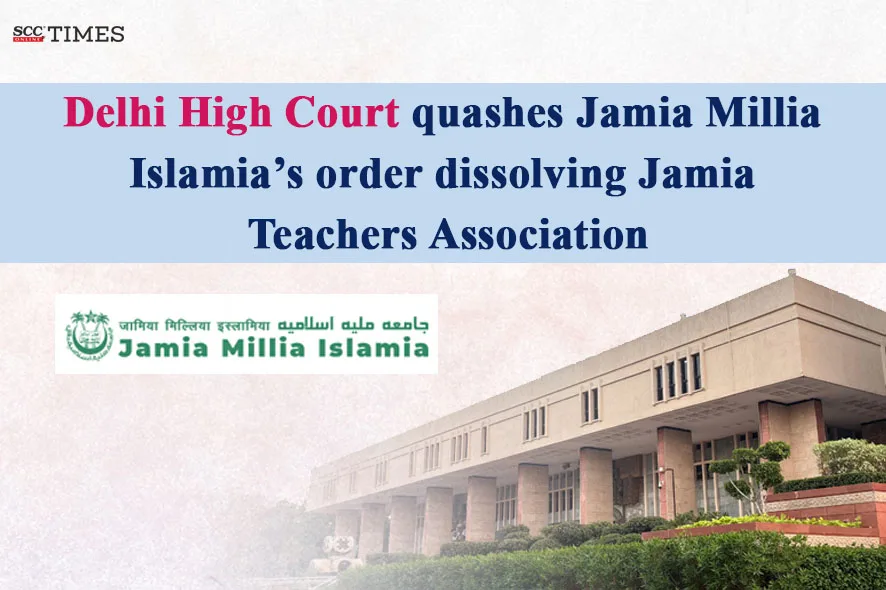Delhi High Court: The petition was filed by the petitioner (‘Jamia Teachers Association’) challenging the orders passed by the respondent, Jamia Millia Islamia (‘Jamia University’), whereby it dissolved the Jamia Teachers Association and sealed its office. A Single Judge Bench of Sachin Datta, J., held that the Jamia University’s actions appeared to be administrative in nature, bearing no rational nexus to a legitimate regulatory purpose. Accordingly, the Court quashed Jamia University’s order and disposed of the petition.
Background
The Jamia Teachers Association, constituted in 1967, was an autonomous body of teachers from Jamia University, governed by a self-regulated Constitution and administered through an Executive Committee (‘Committee’) elected by its members.
The Committee, elected in 2020, was to continue until 2022, thus, it passed a resolution to hold fresh elections. The duly appointed Returning Officer (‘Officer’) issued a notification announcing the election date, and the Jamia University was duly informed of the said notification.
The Jamia University issued a show cause notice alleging the Officer’s appointment as illegal, directing him to step down. Thereafter, order was issued whereby, the pending elections were nullified, the Jamia Teachers Association was dissolved, its office was sealed, its office bearers were restricted from using the premises and its finances and the members were restrained from attending or conducting any meeting. Aggrieved, the Jamia Teachers Association approached the High Court.
This Court had directed Jamia University to convene a meeting with the Jamia Teachers Association’s members to resolve the dispute. However, the meeting did not yield to the desired outcome.
On one hand, the Jamia Teachers Association argued that the actions concerned infringed upon its fundamental right which encompasses not only the right to form an association but also the right to continue and govern it, but on the other hand, the Jamia University contended that Section 23(j) of the Jamia Millia Islamia Act, 1988 (‘Jamia Millia Act’) empowered it with the authority to establish, recognize, regulate, and, if necessary, dissolve associations of teachers and staff. The Jamia University further argued that Article 1 of the Jamia Teachers Association Constitution (‘Association Constitution’) explicitly stated that the Jamia Teachers Association was established in accordance with the provision of the Jamia Millia Act.
Analysis and Decision
The Court viewed that the core issue in the present petition pertained to the extent of permissible interference by the Jamia University in the internal affairs of the Jamia Teachers Association vis-a-vis the constitutional guarantee enshrined in Article 19(1)(c).
The Court pointed that it is well settled that Article 19(1)(c) of the Constitution guaranteed not merely the right to form an association but also the right to continue the association with its chosen composition and internal governance. Further, the Court held that in the present case, the impugned actions of the Jamia University did not cite any exigency contemplated in Article 19(4) of the Constitution, rather the said actions appeared to be administrative in nature, bearing no rational nexus to a legitimate regulatory purpose.
The Court observed that the unilateral formulation and approval of a revised Constitution for Jamia Teachers Association, without consultation or consent of its members, undermined the autonomy of the Association and violated the right to self-governance inherent in Article 19(1)(c) of the Constitution. Considering Section 6(xxiv) of the Jamia Millia Act, the Court observed that while the provision conferred broad powers upon the Jamia University to act in furtherance of its objectives, but the same could not be invoked to override or abrogate the Jamia Teachers Association’s fundamental rights.
Further, the Court opined that Association Constitution to be in consonance with the Jamia Milia Act merely acknowledged the statutory backdrop for the Jamia Teachers Association’s formation and did not imply subjugation to the Jamia University’s regulatory control. Therefore, the Court quashed the order and disposed of the petition at hand.
[Jamia Teachers Association v. Jamia Millia Islamia, 2025 SCC OnLine Del 7120, decided on 28-10-2025]
Advocates who appeared in this case:
For the Petitioner: Abhik Chimni, Gurupal Singh, Pranjal Abrol, Shreya Bajpai and Rishabh Gupta, Advocates
For the Respondent: Pritish Sabharwal, Standing Counsel and Shweta Singh, Advocate



